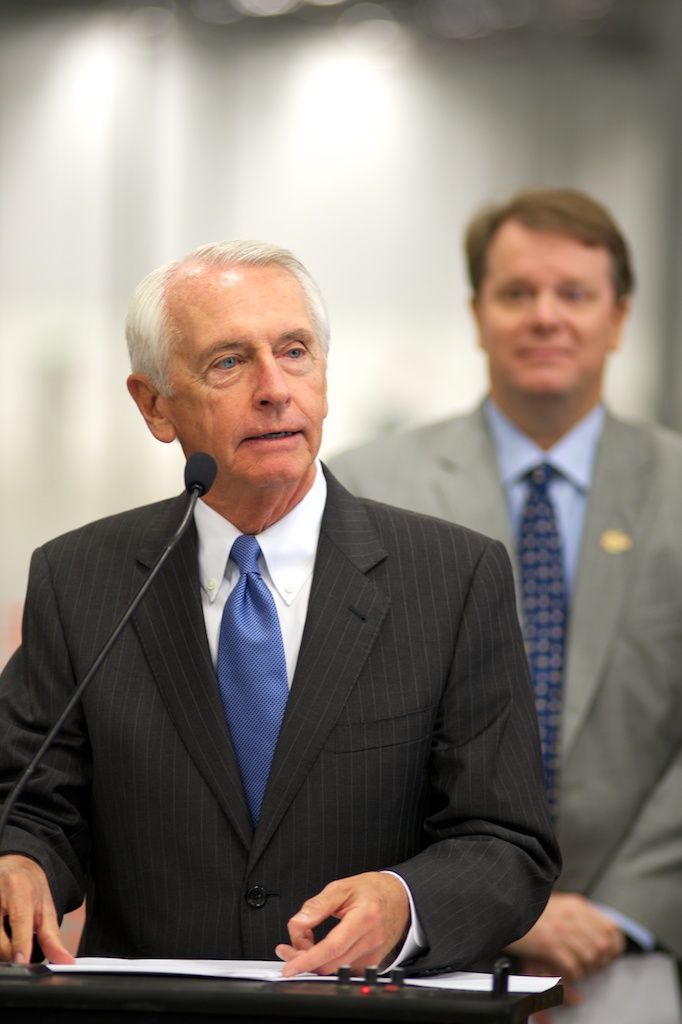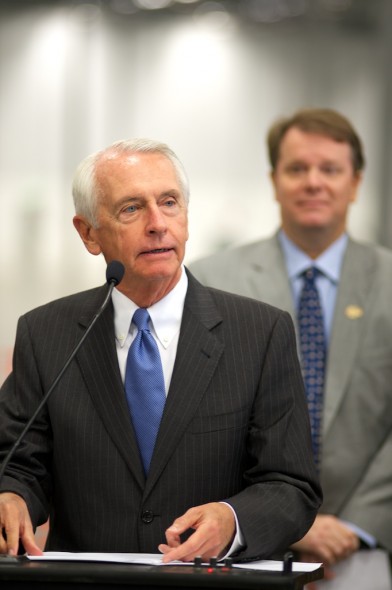Bourbon Keeps Blowing Up

I just returned from a Kentucky Distillers Association press conference in Frankfort, Ky., where there were more politicians than actual distillers. The KDA and politicians were announcing the economic impacts of Kentucky’s distilling industry.
Bourbon now gets people elected in Kentucky. In fact, Senator Mitch McConnell met with KDA members two weeks ago at Four Roses, where one source told me he questioned his opponent Alison Lundergan Grimes’ leadership for the bourbon industry. However, the KDA says McConnell did not talk about Grimes and only spoke about his support for bourbon.
Meanwhile, Governor Steve Beshear said at the presser: “Bourbon is our heritage. It’s a part of our DNA in this state.” While this is true, Beshear is the only governor in my lifetime to make the state’s tax structure more friendly for bourbon distillers.

An interesting bourbon political piece to the presser, Senate President and Kentucky Republican Majority Leader Robert Stivers offered an anecdote about an Indiana senator visiting the Buffalo Trace Distillery. The Indiana senator wrote Stivers about the “Kentucky Bourbon Trail” and said that future State Senator forums should be held at bourbon facilities. Of course, Buffalo Trace is not on the Kentucky Bourbon Trail, which is ran by the KDA.
Here are the key points referenced in the press conference, which were also in the KDA press release.
- Distilling now contributes $3 billion in gross state product to Kentucky’s economy every year, up from $1.8 billion just two years ago, a 67 percent increase.
- More than 15,400 people owe their paychecks to the Bourbon industry, compared to 8,690 in 2012, a 77 percent increase.
- Payroll for those workers has skyrocketed to more than $707 million from $413 million in 2012, a 71 percent increase.
- Average salary for distillery employees is $91,188.
- Distilleries plan to spend $630 million in capital investment over the next five years as the ad valorem “barrel tax” is offset by a corporate tax credit that distillers are required to reinvest in their Kentucky operations. This will create an additional 1,500 jobs, $43 million in payroll and $5 million in tax revenue.
- Total capital investment will surpass $1.3 billion in projects over a 10-year period starting in 2008.
- The number of licensed distilling companies has tripled – from 10 to 31 in two years. That’s the most distilleries in Kentucky since the repeal of Prohibition.
- Distilling remains one of the state’s top job creators with a 4.35 spin-off factor. It now ranks second, behind animal processing, in total employment and job multiplier out of 245 industries.
- Distilling industry employment is up 21 percent since 2000, while the rest of Kentucky’s manufacturers lost 26 percent of their jobs.
- New craft distilleries employ 127 people with salaries totaling more than $4 million. They have invested $30 million and plan to spend another $25 to $30 million in the next five years.
- Total property tax assessments have jumped to $2 billion from $1.3 billion in 2012, a 54 percent increase.
- More than $166 million in tax revenue for local and state governments is generated by spirits production and consumption, up from $126 million in 2012 (a 32 percent increase).
- Bourbon and Tennessee whiskey account for $1 billion of the total $1.5 billion in distilled spirits exports, up from $768 million in 2012. It is, by far, the largest export category among all U.S. distilled spirits.
- Barrel inventories are at their highest levels in 40 years, with more than 5.3 million aging currently in Kentucky. Production levels are up 53 percent in the last two years and 150 percent in the last 15 years.








